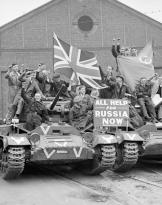Schatzgraber, the secret Nazi base built under the direct order of Adolf Hitler in 1942 during Operation Barbarossa, has been located by a group of Russian scientists. More than 500 artifacts abandoned by the small garrison that were probably stationed in what may have been an advanced meteorological station in the Franz Josef Land archipelago. Remains of bunkers, bullets, petrol cans, clothing, and a bundle of documents were found in what everyone knew as Schatzgraber due to its legendary fame.
The mysterious meteorological station had been built in 1942, and abandoned in July 1944, after much of the desolate garrison died of poisoning for eating raw polar bear meat. A Kriegsmarine U-Boat recovered the few survivors leaving the structure and leaving a halo of mystery on the basis in which it is mentioned in the book by Wettertrupp Haudegen, published in the 1954.
The base had never been located so it remained a sort of legend for a long time; now it will be possible, examining the documents found in perfect state of conservation from the Arctic climate, to trace its work during the Second World War.
The story of Hitler's last soldier
Certain war stories can appear surreal, incredible tales worthy of the pen of a fanciful novelist; but that of Wilhelm Dege, the last soldier of the Third Reich to surrender in the Second World War, is all true.
Commander of the Operation Haudegen, Lieutenant W. Dege had reached the Norwegian archipelago of Svalbard, in the Arctic region, with his team of 11, aboard the U-307 submarine. The goal was to establish a meteorological observation station that would provide the Navy and the Reich Air Force with the information they needed to plan their operations as successfully as possible. On 5 August 1944 the station was made operational and for 12 months the team of specialists in meteorological surveys kept the German High Command informed about atmospheric phenomena in the North European area.
12 months were exhausting; passed in total isolation at temperatures prohibitive for survival, spent fighting hungry polar bears, and living with the constant threat of an ambush of the British Commados, that all over Europe were sent just to eliminate that kind of objectives. Dege and his, however, the Allies never saw them. They regularly transmitted their bulletins until 5 1945 May, until they were informed that Berlin had fallen, the Reich no longer existed and Germany unconditionally surrendered the 7 May.
Equipped only with a small rowing boat, the unit could not abandon the island and was waiting to be picked up by 'someone'. It was only months later, the September 3 of 1945, which saw a small Norwegian boat off the Rijpfjord fjord Blasel.
On board a ship, the ship's captain, L. Albertsen, landed. Dege welcomed Captain Albertsen addressing him in English, but he received no answer. Then he tried in Norwegian, who spoke well of being a translator for the Wehrmacht from 1940 to 1943, and said, "Do we want to discuss our performance here on the beach, or can I offer you coffee and grappa before?" The Norwegian captain replied, "True coffee and true German grappa? Why not!"
 After sharing what was left of rations and cigarettes, the captain revealed embarrassed that the Norwegian Royal Navy had so ordered him to surrender the Germans and bring them back, but that he genuinely had no idea what the procedures were. Even the Germans did not know them; it was then that Wilhelm pulled out his Luger pistol, and resting it on the table he said - "Here you are." With this I surrender. "
After sharing what was left of rations and cigarettes, the captain revealed embarrassed that the Norwegian Royal Navy had so ordered him to surrender the Germans and bring them back, but that he genuinely had no idea what the procedures were. Even the Germans did not know them; it was then that Wilhelm pulled out his Luger pistol, and resting it on the table he said - "Here you are." With this I surrender. "
The Norwegian captain, impatient, could only say, "Can I hold the gun?"
Dege then wrote a document in Norwegian language concerning the surrender that everyone signed: thus making official the surrender of the last German military unit during the Second World War.
Back at home, Wilhelm Dege was the last soldier to be awarded the Knight Cross (worthy of honor) of the 1939-45 conflict. After the war, Dege came in contact with the companions with whom he had lived that hard and unforgettable experience of camaraderie and courage, between frozen nights, privations and loneliness, with nostalgia of the house and the doubt that would remain forever among the snow Norwegians. The meetings continued despite the Cold War tensions that had divided Germany in two and when Dege died of natural causes 1979, his son Eckbart continued this tradition, revealing this extraordinary story to the world.












